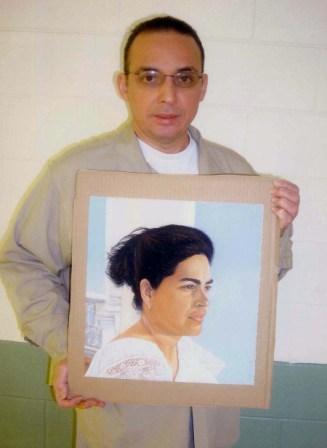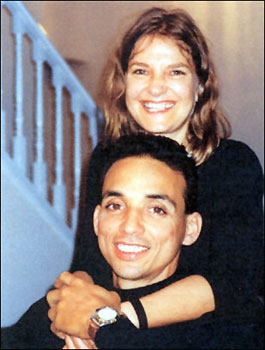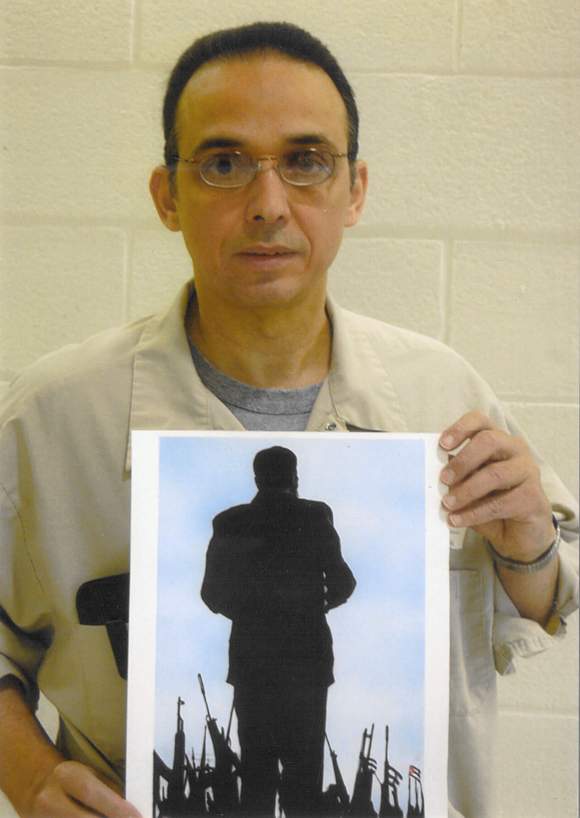Podcast: Play in new window | Download
Listen to Law and Disorder live Monday November 9 at 9:00AM EST WBAI 99.5 FM: At 9:30 AM Michael Ratner Interviews Democracy Now’s Amy Goodman on her new book Breaking the Sound Barrier – Based on her columns for King Features Syndicate, this wide-ranging new collection of articles breaks through the corporate media’s lies, sound-bites, and silence. In place of the usual suspects— the “experts” who, in Goodman’s words, “know so little about so much, explain the world to us, and get it so wrong”
Updates:
- The Beginning of the End? – Former Marine Cpt. Matthew Hoh Resigns
- Jane Mayer: Predator Versus International Law?
- Code Pink Protest Drones in Nevada
Michael Ratner Update: Congress Should Not Reject Goldstone Report
—–
FBI Threaten Deportation To Muslim Man Refusing To Be Secret Informant
It was in 2004, that the FBI began to apply intense pressure on Foad Farahi to become a secret informant and spy on members of his mosque. Farahi, an Imam in Miami Florida refused. As many listeners may know, an imam is among the designated leaders in a community or mosque who leads prayers during gatherings and helps others understand the teachings of Islam. The FBI saw Farahi to be in a unique position to know local Muslim men. Farahi had met several South Floridians who allegedly had links to terrorism, including Jose Padilla.
Farahi refused to become a secret informant and the FBI knew he was in a vulnerable position. His student visa expired and he had applied for political asylum that could allow him to stay in the U.S. indefinitely. More than 2 years had past and in 2007, two agents showed up again asking Farahi to become an informant, he refused. In late 2007 Farahi was at a routine hearing for his political asylum case when he was told by his attorney that the ICE has a file with evidence that he is involved with a terrorist case. He was later presented with an ultimatum to drop the asylum case and leave the United States voluntarily, or be charged as a terrorist. Farahi agreed to voluntarily leave the US, but his passport expired, that gave him a little more time, and he later realized the government was bluffing and then hired attorney Ira Kurzban, a well-known advocate for immigrants’ rights.
(Law and Disorder archive Targeting Muslims Page 1 / Page 2)
Kurzban asked the Board of Immigration Appeals to throw out Farahi’s voluntary departure order, they refused. The legal battle has put Farahi’s immigration status in limbo. Kurzban told the Miami Times quote I think the real issue is, does the government have the right to pressure people… to make them informants?” —- “It’s clearly modus operandi of the FBI to recruit people who are going to be informants and to use whatever leverage they can.”
- Foad as an Imam, did not want to spy on others, but said to the FBI he would help them anyway he could.
- He was then put into removal (deportation) proceedings.
- The guilt by association method that the FBI has been using as an intimidation tactic is very reminiscent of the McCarthy period.
- The judge who originally denied Foad’s hearing was dismissed.
- We are now at the 11th Circuit of Appeals and an oral argument has been set.
- Immigrantslist.org – Political Action Committee
- This case represents a much broader pattern by the FBI and the government in trying to intimidate people into working as informants.
- They’re desperate to get informants but they’re using upstanding citizens to do bad things.
- The tragedy is that they’re turning people who are friendly to the United States into enemies.
Guest – Attorney Ira Kurzban, an adjunct faculty member in Immigration and Nationality Law at the University of Miami School of Law and Nova Southeastern University School of Law and has lectured and published extensively in the field of immigration law, including articles in the Harvard Law Review, San Diego Law Review and other publications.
——–
Michael Steven Smith – In Memory of Bob Boehm, Center for Constitutional Rights Vice President
On the recent eighth anniversary of the events of September 11th, our own Michael Steven Smith, draws a balance sheet on the state of democratic rights in America. He spoke to a captive audience on the long standing Five Towns Forum on Long Island in honor of recently deceased Center for Constitutional Rights Vice President Bob Boehm.
——-
Cuban Five Update: The Re-sentencing of Antonio Guerrero
Earlier this month, Federal Judge Joan A Lenardo replaced the life sentence for Antonio Guerrero, one of the Cuban Five. Mr. Guerrero, a United States citizen, was convicted of spying for Cuba while working at the Naval Air Station in Key West. His sentence was reduced to almost 22 years, which means he could be out of prison in nearly seven years. Mr Guerrero’s attorneys had asked for the sentence to be reduced to 240 months, but Judge Lenardo set it at 262 months.
Mr. Guerrero’s lawyer, Len Weinglass told the New York Times, it was an odd decision, he said “You have a man who was on a military base but who didn’t take a single classified document and no one testified that he injured U.S. national security, but the judge still rejects the prosecutors’ request to lighten the sentence.” Transcript of Hearing
Len Weinglass:
- Antonio Guerrero who I represent, was originally sentenced to life in prison.
- The appellate courts reduced the life sentence for the conspiracy to commit espionage against 3 of the Cuban Five
- The decision only remanded life sentences for ultimately 2 of the Cuban Five including Antonio Guerrero
- We returned to Miami for the re-sentencing on October 13. Prior to the re-sentencing, we negotiated with the government on the issue of re-sentencing alone, making it clear there was no admission of guilt on the underlying charge, which we are still contesting on a later collateral attack.
- We agreed that it should come down from a life sentence to a period of 20 years.
- In Miami, the judge took the very unusual step of setting the agreement aside, and set the term to 21 years and 10 months.
- You can’t give a life sentence ( in this case) on what they intended to get, you can only give a life sentence on top secret information they did get. So, the original life sentence was wrong.
- When we got into the re-sentencing hearing, she got back to her original position as if the appellate court hadn’t ruled.
- I got very upset, the courtroom was packed. Packed with the same old crowd. The crowd in Miami that backs these para-miltary forces, they put the widows up front.
- I got upset at what I sought to be a climate that was being generated in that hearing and so I reminded the judge very forcibly that she was sentencing an individual not a country.
- I had given the court government documents from the Bureau of Prisons, all of them saying that Antonio Guerrero who was serving a faulty life sentence, and sent to a maxium security prison, which he shouldn’t have been sent, because the sentence was wrong.
- But the warden, his counselor and the supervisor of the unit, all extolled his behavior and most significantly pointed out that he had helped save a number of inmates all of whom were doing life sentences, from an encouragable future, by training them in English and Math and overseeing them getting their GED.
- At that time, she was about to pronounce sentence, then she stopped, walked off the bench.
- When the judge came back, the first thing she did is recite a Supreme Court decision, all federal judges must sentence an individual according to his character.
- Antonio was 39 when he was arrested and he will be nearly 60 when he is released. That’s the heart of a lifetime.
- There was no acknowledgment of context here. That this was provoked by a pattern of violence by the US directed at Cuba. Where more than 3000 people have died in the past 40 years from violence coming from Southern Florida.
- The Cuban Five performed their task, nobody was harmed, no property damaged and they end up with life sentences for that operation.
- It came to light that the federal government was paying members of the press in Miami as part of their anti-Castro campaign to write articles about this case that were highly prejudicial. People who were reporters but were on the federal payroll.
- Can the government be responsible for creating a prejudicial atmosphere?
- He was at the most hard-nosed prison and after seven years the warden of that prison wrote the Regional Bureau of Prisons, asking that Antonio be released from that prison. He doesn’t belong, there, he is a lovely sensitive man.
Guest – Attorney Len Weinglass, who represented the Cuban Five, as William Kunstler’s younger partner, Len Weinglass was considered the work horse of the defense team. He’s worked on a number of political cases including the Pentagon Papers trial and the Angela Davis case. He’s a Yale Law School graduate and former U.S. Air Force Captain.
—————————————————————————————————————-



